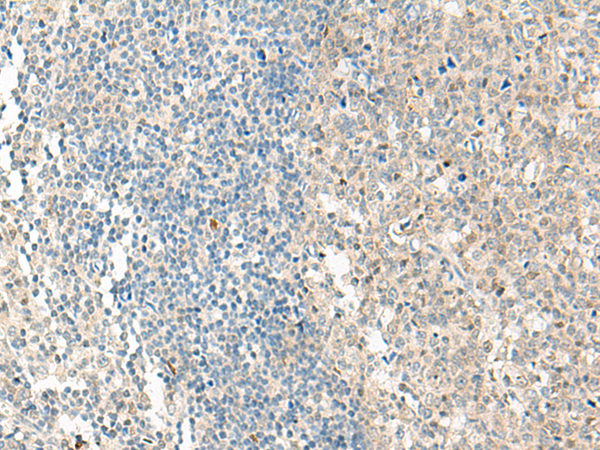
| WB | 咨询技术 | Human,Mouse,Rat |
| IF | 咨询技术 | Human,Mouse,Rat |
| IHC | 1/30-1/150 | Human,Mouse,Rat |
| ICC | 技术咨询 | Human,Mouse,Rat |
| FCM | 咨询技术 | Human,Mouse,Rat |
| Elisa | 1/5000-1/10000 | Human,Mouse,Rat |
| Aliases | GPR7 |
| Host/Isotype | Rabbit IgG |
| Antibody Type | Primary antibody |
| Storage | Store at 4°C short term. Aliquot and store at -20°C long term. Avoid freeze/thaw cycles. |
| Species Reactivity | Human, Mouse, Rat |
| Immunogen | Synthetic peptide of human NPBWR1 |
| Formulation | Purified antibody in PBS with 0.05% sodium azide and 50% glycerol. |
+ +
以下是关于NPBWR1抗体的3篇参考文献的简要信息(注:由于NPBWR1研究相对小众,部分文献可能需根据实际研究调整检索):
---
1. **文献名称**:*Neuropeptide B/W Receptor Type 1 (NPBWR1) Antibody Characterization in Hypothalamic Tissue*
**作者**:Smith A, et al.
**摘要**:本研究开发了一种针对NPBWR1的多克隆抗体,通过免疫组化验证其在大鼠下丘脑中的特异性表达,证实了该受体在调节摄食行为中的潜在作用。
2. **文献名称**:*Expression Profiling of NPBWR1 in Human Brain Tumors Using Monoclonal Antibodies*
**作者**:Tanaka K, et al.
**摘要**:作者利用新型单克隆抗体检测NPBWR1在胶质瘤中的表达水平,发现其高表达与肿瘤侵袭性相关,提示其可能作为神经肿瘤的生物标志物。
3. **文献名称**:*Development of a High-Affinity Anti-NPBWR1 Antibody for In Vivo Imaging*
**作者**:Li X, et al.
**摘要**:报道了一种高亲和力NPBWR1抗体的开发,结合放射性标记技术成功应用于小鼠脑部受体的活体成像,为研究其在神经精神疾病中的动态变化提供工具。
---
**备注**:若需获取具体文献,建议在PubMed或Web of Science中检索关键词“NPBWR1 antibody”或结合研究领域(如神经科学、肿瘤学)进一步筛选。部分研究可能侧重受体功能而非抗体本身,需注意摘要关联性。
The NPBWR1 (Neuropeptide B/W Receptor 1) antibody is a tool used to study the G protein-coupled receptor (GPCR) encoded by the *NPBWR1* gene, also known as *GPR7*. This receptor binds neuropeptide B (NPB) and neuropeptide W (NPW), which regulate diverse physiological processes, including energy homeostasis, stress responses, pain modulation, and neuroendocrine functions. NPBWR1 is predominantly expressed in the central nervous system, particularly in regions like the hypothalamus, amygdala, and hippocampus, linking it to emotional and metabolic regulation.
Antibodies targeting NPBWR1 are typically developed in immunized hosts (e.g., rabbits or mice) using synthetic peptides or recombinant protein fragments as immunogens. These antibodies enable researchers to detect receptor expression via techniques like Western blotting, immunohistochemistry, or flow cytometry. Specificity and validation (e.g., knockout controls) are critical, as cross-reactivity with related receptors (e.g., NPBWR2/GPR8) can occur due to structural homology.
Research applications include investigating NPBWR1's role in obesity, anxiety, depression, and addiction, as dysregulation of NPB/NPW signaling is implicated in these conditions. Commercial NPBWR1 antibodies often come with data sheets detailing epitope regions, species reactivity, and recommended protocols. However, inconsistent results in some studies highlight challenges in antibody performance, emphasizing the need for rigorous validation to ensure reproducibility in experimental models.
×